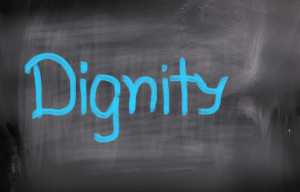 {3:20 minutes to read} My colleague Joy Rosenthal, an attorney and mediator whom I admire for her ability to always put other people’s needs ahead of hers, wrote an article after reading “Dignity: Its Essential Role in Resolving Conflict” by Donna Hicks, PhD. I was so impressed by Joy’s words that I preferred to quote them here below (with her permission) rather than paraphrase her writings:
{3:20 minutes to read} My colleague Joy Rosenthal, an attorney and mediator whom I admire for her ability to always put other people’s needs ahead of hers, wrote an article after reading “Dignity: Its Essential Role in Resolving Conflict” by Donna Hicks, PhD. I was so impressed by Joy’s words that I preferred to quote them here below (with her permission) rather than paraphrase her writings:
Dignity starts with the concept that we each have inherent worth as human beings. Every person does. No matter what they have done, no matter how they act, no matter where they are from, how rich or poor, how well educated, their race, gender, or familial status — none of that matters. This includes people who have oppressed us, people who have hurt us, people who have violated our dignity. We will each retain our dignity throughout our lives — no one can take it away.
Dignity is different from respect. There may be people for whom you or I have little or no respect, but that does not take away their inherent worth — it does not take away their dignity. There certainly may be actions that people take that you do not respect. Yet they still have dignity.
Donna lists ten elements of dignity, and ten temptations to violate one’s own dignity. Basically, she says that to honor the dignity of others, you must hear what they are saying and acknowledge who they are, even if you don’t agree with them.
What strikes me in thinking about this concept is that the more I treat others with dignity, the more I bestow dignity upon myself. The more I treat others with elegance and grace and humility, the more I carry myself with class. And people treat me better as a result. When I am kind to my neighbor, or look into the eyes of a homeless person, or listen to an elder, it may seem that I am acting from a spirit of generosity. But, when I recognize the inherent worth of others, I am recognizing my own inherent worth as well. Acting with dignity is really a matter of self-care — one of the kindest gifts you can give yourself.
Whether we are in conflict with a spouse, family member, or someone else we have encountered in our lives, we should remember that they still have dignity and should be treated as such. Treating someone with respect and dignity does not mean that you have to agree with them, only that you are recognizing their right to be who they are, and how they feel.
Jennifer Safian
divorce and family mediation
upper east side of manhattan (nyc)
new york, ny
(917) 881 5206
jpsafian@gmail.com
Latest posts by Jennifer Safian (see all)
- misinterpreting your partner’s demeanor may lead to conflict - October 9, 2024
- demystifying the money talk - September 11, 2024
- why are we afraid to discuss money? - August 21, 2024





Leave A Comment